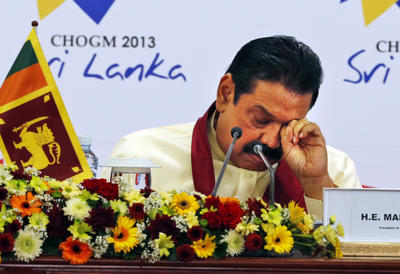While construction continues to be a strong feature of growth in the north as the region recovers from civil war, and foreign investment is also robust, there the good news ends. Two events illustrate that the nepotistic, authoritarian Rajapaksa government is struggling to maintain the island’s reputation as a democratic, liberal polity.
First, the provincial council election in the Northern Province in September was won convincingly (30 of 38 seats) by the opposition Tamil National Alliance (TNA). Given the Rajapaksa government’s development efforts in the north, the role of the TNA as a proxy for the Tamil Tigers, and the fact that the government dominates all eight other councils, this convincing victory by the TNA was a virtual referendum condemning the government’s strategy of refusing to devolve power. The government’s position has also been undermined by the behaviour of the army, which has assumed many of the traits of an occupying force and is widely disliked throughout the province.
Second, the hosting of the 2013 Commonwealth Heads of Government Meeting (CHOGM) in Colombo in November fell well short of providing a showcase for progress on the island, as the government had hoped it would. It provided instead a venue to point to deteriorating human rights on the island. The fact that the official CHOGM website up until 6 December opened with quotes (now removed) of congratulation from the likes of Russia’s Vladimir Putin and Afghanistan’s Hamid Karzai about sums up the international reception of the island’s assumption of the role of Commonwealth Chair.
The Prime Ministers of Canada, India and Mauritius declined to attend. Manmohan Singh’s refusal can be mainly attributed to the perceived need to garner the Tamil vote in the forthcoming national election, due by May 2014. Although Britain’s Prime Minister Cameron did attend, he pointedly visited Jaffna and angered President Rajapaksa by demanding an inquiry into the alleged serious human rights abuses following the end of the civil war in May 2009. ‘It’s fair to say’, he said, ‘there needs to be an independent inquiry into the particularly dreadful things that happened at the end of the war but if they [the Sri Lankan government] do not set it up I will fully back an international inquiry [by the UN]’. Even China, hitherto a ‘rusted on’ supporter of the Rajapaksa government, was reported in The Diplomat to have been mildly critical, calling on Sri Lanka to ‘make efforts to protect and promote human rights’.
In contrast, Australia’s Tony Abbott commented: ‘We accept that sometimes in difficult circumstances, difficult things happen’. Presumably this statement was in deference to the fact that Australia is dependent on Sri Lanka to police the departure of boats containing asylum seekers. Over 6000 Sri Lankan boat people reached Australian waters last year (5215 of them Tamils).
The next challenge to Sri Lanka on human rights will be the meeting of the UN Human Rights Council (UNHRC), expected in March next year. The US will frame a tough resolution condemning the Rajapaksa government’s human rights record. As quoted above, British PM Cameron has threatened he will demand a UN probe. UN High Commissioner on Human Rights, Navi Pillai, was deeply put out that heavy-handed security authorities harassed some of those with whom she spoke during her visit to the island in August 2013. At the end of the visit she accused the government of ‘showing signs of heading in an increasingly authoritarian direction’. She too threatened an international probe into human rights abuses. She has also been critical of the growing tendency to attack Muslim and Christian minorities.
None of this is likely to deter President Rajapaksa. Any tough resolution introduced into the UNHRC will likely again be watered down, just as it was in March this year. So far President Rajapaksa’s authoritarian stance has not significantly affected him or his government where it matters: in the ballot box (except in Northern Province); amongst those international players that provide sources of oil and of remittances, like Saudi Arabia; and bankrollers of Sri Lanka’s infrastructure boom such as China. Indeed, in many ways Sri Lanka offers an important bellwether for the future of human rights in the ‘Asian century’.
Dr Sandy Gordon is a Visiting Fellow at the ANU College of Asia and the Pacific, Australian National University.
This article is a part of an EAF special feature series on 2013 in review and the year ahead.

